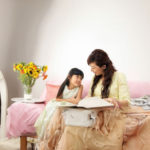If you are hot-tempered parents or scold your child, stop right now, because you are committing a very serious crime, no different from someone who is sexually abusing their own child.
A group of scientists at Wingate University (USA) and the Language and Mind Department at the University of London (UK) published a study in the journal Child Abuse and Neglect in early October that verbal abuse and cursing with words is an extremely dangerous form of child abuse.

Professor Shanta Dube, the current Director of the Community Health Program at Wingate University, stated that verbally abusive words will have lifelong consequences for children. Parents or teachers, grandparents, relatives, neighbors… who scold children in their early childhood will make them prone to anger, depression and mental decline.
The harm of such scolding words is no different from the act of sexually abusing young children, causing long-lasting and even permanent damage, reducing children’s IQ and EQ.
Many parents underestimate verbal violence
We see a slap, a punch as violence, but few recognize that scolding words to children are also dangerous violence. Therefore, verbal violence is still overlooked.
Words Matter, an organization dedicated to protecting children from verbal abuse, has spoken out against adults shouting, insulting, and demeaning children in conversations. They need to think carefully before speaking and take the time to heal the child’s emotions if they unintentionally say something hurtful. The scolding behavior of adults is extremely harmful to young children, as it traumatizes them.
Many parents believe that words are quickly forgotten, sometimes they are under pressure in life and cannot keep calm words with their children. But if they are not aware, the consequences will be unpredictable.
Scolding words are a serious form of abuse
Many people still do not understand child abuse. Sometimes they think that child abuse is only physical abuse and sexual abuse. But in fact, child abuse includes four types: physical abuse, sexual abuse, emotional abuse, and verbal abuse. Verbal abuse is often openly expressed but overlooked. Moreover, many people are not aware of the harmful effects of words.

Jessica Bondy, founder of Words Matter, an organization dedicated to protecting children from verbal abuse, emphasizes that adults must recognize and end their behavior so that children have a chance to develop. If parents do not change, the future of their children will be unclear. Nowadays, according to the World Health Organization (WHO), the rates of sexual abuse and physical abuse of children have decreased, while emotional abuse has increased.
Parents must change and protect their children from the scolding of others
Faced with the consequences of verbal abuse, parents need to change their approach to their children. Change now, learn to be patient with your child.
In addition to changing themselves, parents need to pay attention to protecting their children from the scolding of others, such as teachers, grandparents, neighbors, acquaintances… Parents need to take strict measures when they see their children being scolded by others.



































